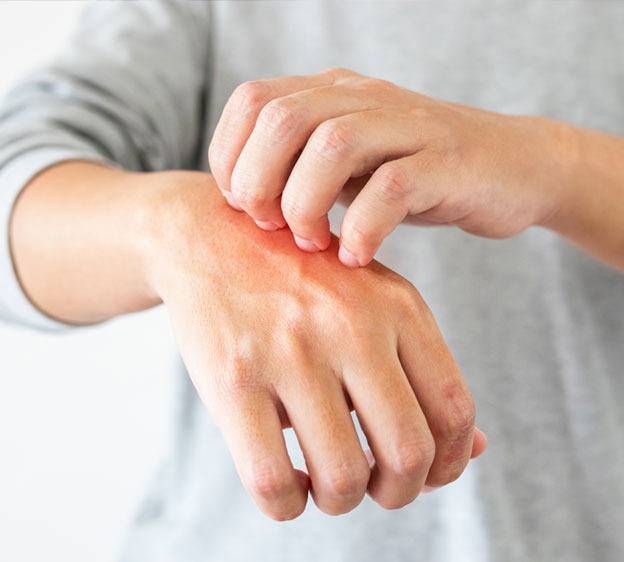Allergic Reactions: Know When To Go to the ER
April 1, 2021
In recent years, awareness about food allergies has expanded. Restaurants promote themselves as allergen safe, schools ban treats that contain nuts and product packages list possible cross-contaminations. But food sensitivities are not the only allergies that can cause severe reactions and even death. Insect stings and medications can also cause problems for some people.
“With more medications out there these days, we see a growing number of allergic reactions,” says Dr. Stephen Larson, a board-certified emergency medicine physician at Beaufort Memorial Pratt Emergency Center.
Symptoms of Allergic Reactions
Hives — red, blotchy swollen areas of skin — are common symptoms, as are rashes, bloodshot eyes, sneezing and wheezing.
“When there is swelling around the lips or back of the throat, that’s when we get concerned,” Dr. Larson says. “That could compromise someone’s ability to breathe.”
Throat swelling or closure is a sign of anaphylaxis, the most severe type of allergic reaction that, without treatment, can lead to death. Another sign of anaphylaxis is a drop in blood pressure. When that happens, you might feel lightheaded or faint.
Read More: Help for Seasonal Allergies
What to Do for Allergic Reactions
If your allergic reaction leads to mild symptoms, such as sneezing or a rash, Dr. Larson recommends using over-the-counter products, such as topical hydrocortisone creams and antihistamines. But if the symptoms become more intense, for example a rash developing into hives, visit a Beaufort Memorial Express Care & Occupational Health clinic.
“If you have a raised, itchy rash, you’ll probably benefit from oral steroids, like prednisone,” Dr. Larson says. “But if you’re experiencing wheezing, throat swelling or difficulty swallowing, or you’re feeling lightheaded or faint, you need to seek emergency care.”
A medication called epinephrine, which is injected with a prescription EpiPen, can help prevent anaphylaxis in yourself or your child. However, it’s still important to go to the emergency room.
“There can be side effects to using an EpiPen, as you’re essentially injecting yourself with adrenaline,” Dr. Larson says. “So it’s a good idea to be evaluated after you use it.”
If you or a loved one could be having a severe allergic reaction, get treatment immediately at the Beaufort Memorial Pratt Emergency Center.

